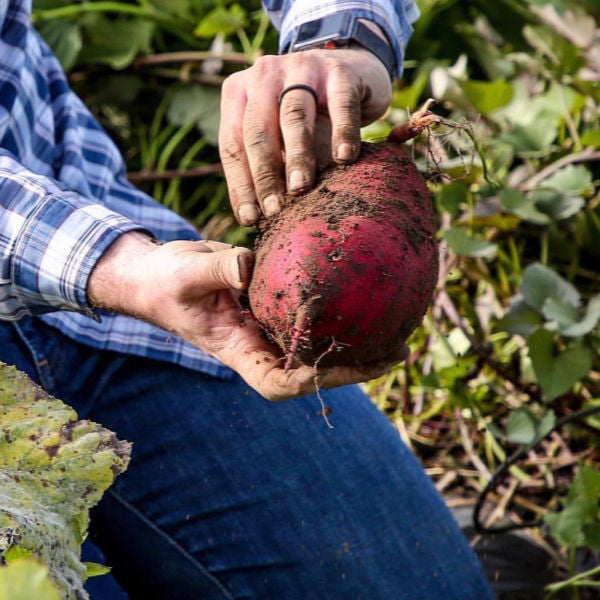Sweet Potato Harvest at Pitney Meadows Community Farm. Photo: Pitney Farm instagram
Farmers of family-owned farms coaxed the fruits from our rich soil that allowed us collectively to build our country, feed our citizens, and construct the most powerful economy in the world. Yet, after a peak of 6.8 million farms in 1935, the number dropped precipitously as people sought employment opportunities outside of agriculture. The need for food continued to increase however. So as the number of family farms diminished, the average size of farms grew from 155 acres in 1935, to 444 acres in 2017, according to the USDA. Currently, there are about 2.05 million farms in the United States. In New York today, there are 35, 500 farms in operation, with a total acreage of 7.2 million.
In addition to sourcing our food from corporate farms instead of family farms, there was a significant shift in the way food at these farms was produced. Old-fashioned organic fertilizers (compost, manure) were largely replaced with chemical fertilizers and pesticides; advances in seed technology put heirloom seeds out of business; animals were moved from the pasture to lots indoors.
We could argue all day over the impact of these changes on the land, the environment and hungry people in third-world countries. Overall, has the tech-farm revolution helped or hurt humanity? It’s an incredibly complex issue. One thing that few would dispute though, is that lovers of chem-free organic agriculture and those who want to pursue small-scale farming — even, dare we say it, the spirit of rural America — have suffered, though the local food movement has been making important strides towards reestablishing the importance of the “older”, family fam ways.

Children getting their hands dirty at Pitney Meadow Community Farm. Photo: Pitney Farm instagram
That’s why organizations like Saratoga Springs’ Pitney Meadows Community Farm, are so important.
“When I learned about the dream of turning a patch of working farmland into a permanent farm and a community resource, I knew I wanted to get involved,” Dr. John Sconzo, a practicing anesthesiologist and a member of Pitney Farm’s board, told New York Makers in a recent, rainy tour of the farm’s bountiful acres and greenhouse. Dr. Sconzo is a doctor by trade, by a gourmand at heart. He helped found Slow Food Saratoga in 2008, and currently operates a global travel company specializing in custom gastronomic and beverage tours, Rascal & Thorn, with Charles Grabitzky.
“Everyone involved in the farm, from the Arnolds, who run a family farm in Argyle, to the Londons [of Max London fame], to Michael Kilpatrick and the rest of the board, wants to make good food not only accessible to everyone from children to adults in the area, but also understandable,” he says.
No easy task. Especially considering how distressingly divorced so many of us have become from our food roots. (An infamous British survey found that 13% of school-age children believe that pasta comes from an animal, 14% think bacon comes from cows, sheep, or chickens, 18% think fish fingers are made of chicken and 10% don’t realize that carrots and potatoes grow underground. Similar results have been found on smaller scales in less-formal studies around the world.)
With that in mind, Pitney has approached the task of connecting eaters to the land in a number of different ways.
IN A NUTSHELL
In 2016, former Pitney Farm owner Bill Pitney handed the keys of his 154-year-old family farm to Sandy Arnold, and the 166-acre nonprofit Pitney Meadows Community Farm was born, with the goal of becoming an organic agricultural resource for residents of the city, a training hub for would-be farmers, with trails for hiking, biking and skiing. The property was sold for roughly $2.43 million, of which the Pitney family donated $645,000 to the nonprofit. The remaining amount was covered through private donations and a loan from Adirondack Trust. Saratoga Springs also chipped in $1.13 million to ensure the land would be permanently preserved. “We were so encouraged and inspired by the donations of the Pitney family, the city and others,” Dr. Sconzo remarks. “It speaks volumes about the community’s investment in the project and desire for a tangible connection to the food we grow and eat.”

Raised garden beds at Pitney Meadow Community Farm. Photo: Pitney Farm instagram
COMMUNITY GARDENS
For a nominal fee, anyone in Saratoga Springs can rent a plot of Pitney’s 72-bed community garden to farm themselves for the growing season. Those sans green thumbs will receive help, advice and support from the farm team so they can coax their organic heirloom vegetable of choice into full bloom.
TRAINING FARM
A farming school that will train the next generation of would-be farmers is currently in the works.
COMMUNITY EDUCATION
Pitney Farm hosts frequent hands-on gardening classes and story times for school-age children when weather allows (generally Spring - early Fall).
FARM HUB
Pitney is currently transitioning all of the acreage to organic, with the goal of creating an operational mixed vegetable, small grain, and livestock farm in a few months. Pitney has an agreement with Skidmore College to pick up some produce, with the rest headed for food banks and Farm to School programs. (As a nonprofit organization, “selling” the food is a complicated undertaking.)
NATURE TRAILS
Places to hike, stroll, bike, and ski are open to all.

'Fire Feast' at Pitney Meadow Community Farm. Photo: Pitney Farm instagram
COMMUNITY EVENTS
Community feasts, u-pick parties, live music, and more have been held at Pitney thus far. And while the roots are firmly planted in the local community, the farm still looks across the globe for inspiration. “We love the food scene in Saratoga Springs, and it has grown in leaps and bounds in recent years,” notes Dr. Sconzo. (He’s not kidding: legendary celebrity chef David Burke is just the latest of many international chefs to set their sights on Saratoga in recent years). “So we invite chefs from all over the country and world to cook with us at our events,” he says. “They cook alongside the best chefs in Saratoga, exchange ideas, network. We believe it’s important to look beyond our borders for inspiration and flavor, while still nurturing our agricultural roots here.”
In other words, think global, grow local? Sounds delicious. Swing by Pitney Farms and see their vision taking root. 223 West Avenue, Saratoga Springs.


Leave a comment